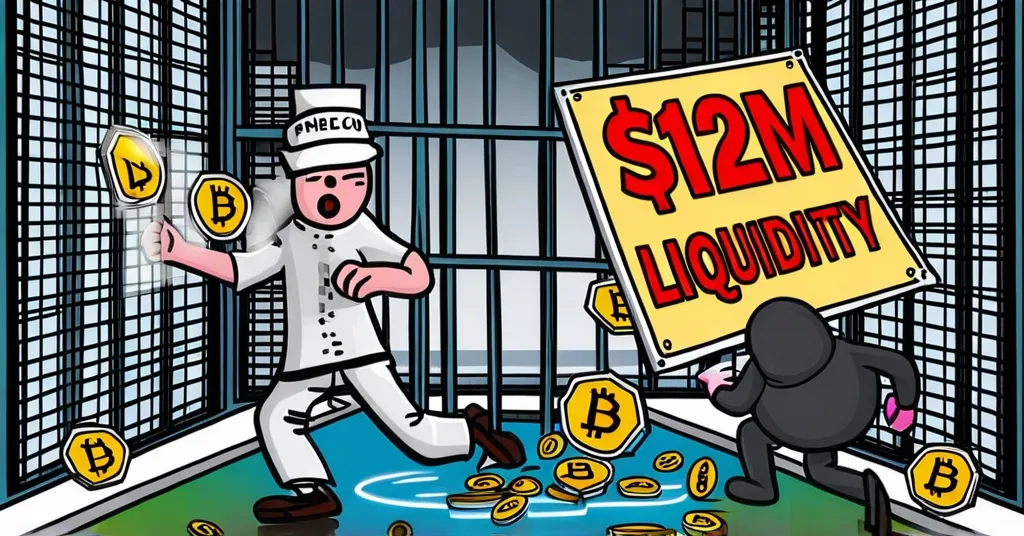Ross Ulbricht’s Pardon Triggers $ROSS Memecoin Disaster: $12M Lost in DeFi Blunder

Ross Ulbricht’s Release Sparks $ROSS Memecoin Fiasco: A $12 Million DeFi Lesson
Ross Ulbricht, the mastermind behind the Silk Road darknet marketplace, was recently pardoned by President Trump, prompting his supporters to create the $ROSS memecoin in celebration. However, enthusiasm turned to costly errors as wallet operators lost an estimated $12 million due to mismanagement of the memecoin’s liquidity pool on the Solana-based DEX, Meteora.
- Ross Ulbricht pardoned by President Trump
- $ROSS memecoin created to celebrate Ulbricht’s release
- Errors in liquidity pool management lead to $12 million loss
On January 21, President Trump granted a “full and unconditional” pardon to Ross Ulbricht, citing government overreach as a reason. Ulbricht’s release from a federal prison in Arizona was celebrated by the libertarian community, which had long advocated for his freedom. In a nod to this support, fans of Ulbricht launched the $ROSS memecoin, sending half of the token supply to donation wallets associated with his family.
Yet, the excitement quickly turned sour. The operators of these wallets, perhaps dazzled by the spotlight and unfamiliar with the intricacies of decentralized finance (DeFi), made critical errors when attempting to cash out their $ROSS tokens on Meteora. A liquidity pool, for those new to the scene, is a pool of funds that facilitates trading on a decentralized exchange. The operators set the initial liquidity pool price too low, inadvertently allowing a profit-taking bot to swoop in and buy 5% of the token supply at a steep discount. These bots, known as MEV (Miner Extractable Value) bots, are sophisticated software that exploits price differences on blockchains for quick profits.
Undeterred but evidently not wiser, the operators made a second attempt to add liquidity, this time with a larger quantity of tokens. Again, they set the price too low, and another MEV bot seized the opportunity, acquiring 35% of the token supply. The total worth of the tokens before the bots bought them? A staggering $12 million. Talk about a rookie mistake that could make even the most seasoned crypto trader cringe.
This debacle underscores the complexities and potential pitfalls of DeFi. While the promise of decentralized finance lies in its ability to offer financial freedom and innovation, it also demands a deep understanding of its mechanics. The operators of Ulbricht’s donation wallets learned this the hard way, illustrating that enthusiasm alone isn’t enough to navigate the treacherous waters of crypto trading and liquidity management.
Ulbricht’s release and the subsequent $ROSS memecoin fiasco provide a stark reminder of his cultural impact within the cryptocurrency and libertarian communities. His story was one of the first to intertwine Bitcoin with illicit activities on a grand scale, and his pardon reflects a broader shift in policy towards the crypto sector. Yet, the mishandling of the $ROSS token also highlights the need for education and caution in the world of decentralized technologies.
As for the future of $ROSS, it remains uncertain whether Ulbricht’s newfound celebrity status will drive renewed interest in the token or if it will continue to decline without further developments. Meanwhile, the Solana network continues to be a playground for MEV bots, with operators like Jito Labs generating nearly $500 million from such operations in 2024.
The story of $ROSS serves as a cautionary tale for anyone dabbling in memecoins and DeFi. While the potential for profit is tantalizing, the risks are equally significant. As Ulbricht begins anew, his supporters might want to take a page out of his playbook—innovate, but with a healthy dose of skepticism and a keen eye for detail.
While it’s easy to criticize the mishandling of the $ROSS memecoin, it’s important to recognize that DeFi is still a frontier where even experienced players can stumble. The incident also highlights the broader implications of MEV bots on the Solana network, which exploit inefficiencies across various DEXes, not just Meteora. For instance, a trader once mistakenly bought WIF at $3 instead of $0.20, leading to an MEV bot capitalizing on the error. These bots are a reminder of the need for constant vigilance in the crypto space.
Looking ahead, the $ROSS token’s trajectory remains uncertain. Could Ulbricht’s newfound celebrity status drive renewed interest, or will the token’s value continue to decline without further developments? Only time will tell. But one thing is clear: the crypto community needs more education on DeFi to avoid similar pitfalls in the future.
Key Takeaways and Questions
- Why was Ross Ulbricht pardoned by President Trump?
President Trump’s pardon of Ross Ulbricht was seen as a thank you to the Libertarian Party and a stance against government overreach.
- What percentage of the $ROSS token supply was sent to donation wallets?
50% of the $ROSS token supply was sent to these wallets.
- What mistakes did the wallet operators make when trying to cash out $ROSS tokens?
They set the initial liquidity pool price too low on Meteora, allowing a profit-taking bot to buy at a discount. They repeated this error with a larger quantity of tokens.
- How much potential profit was lost due to these errors?
Around $12 million in total value was lost due to the errors in selling off 40% of the token supply.
- What is a profit-taking bot and how did it impact the $ROSS situation?
A profit-taking bot, or MEV bot, is a type of software that exploits price differences on blockchains. It purchased 5% of the $ROSS token supply at a discount due to the low liquidity pool price set by the wallet operators.



